(SCO Tianjin Summit) Xinhua Headlines: How Xi champions Shanghai Spirit to foster new type of international relations
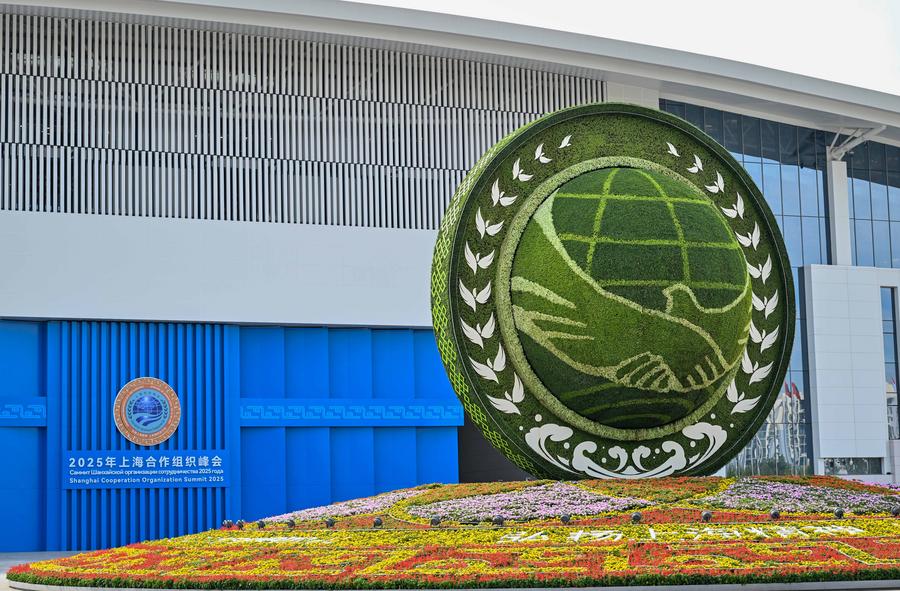
This photo taken on Aug. 30, 2025 shows an exterior view of the main venue of the Shanghai Cooperation Organization (SCO) Summit 2025 in Tianjin, north China. (Xinhua/Sun Fanyue)
After 24 years of robust development, the Shanghai Cooperation Organization (SCO) has emerged as an organization with increasing clout and global recognition as it convenes the largest-ever annual summit in its birthplace, China.
Chinese President Xi Jinping will chair the summit in the port city of Tianjin from Sunday to Monday, when member states are expected to adopt key documents, including the organization's development strategy for the next decade.
Xi is also expected to unveil China's new measures and actions to support the SCO's high-quality development and all-round cooperation, while outlining pathways for the organization to contribute constructively to safeguarding the post-WWII international order and enhancing the global governance system.
Founded in Shanghai in June 2001, the SCO has expanded from six founding members into a 26-nation family of 10 members, two observers and 14 dialogue partners spanning Asia, Europe and Africa.
With major emerging markets and developing countries such as China, Russia and India among its members, the SCO represents nearly half of the world's population and a quarter of the global economy, standing as a key pillar of regional stability and practical cooperation.
The Tianjin summit will mark President Xi's second time hosting the event. Since taking over the helm of China, Xi has attended 12 SCO summits, helping shape the SCO's strategic direction and propelling it toward a more influential role in global governance.
"The SCO has matured into a robust framework, exuding strong vitality," Xi said in the lead-up to the summit. "It has set an example of a new type of international relations."
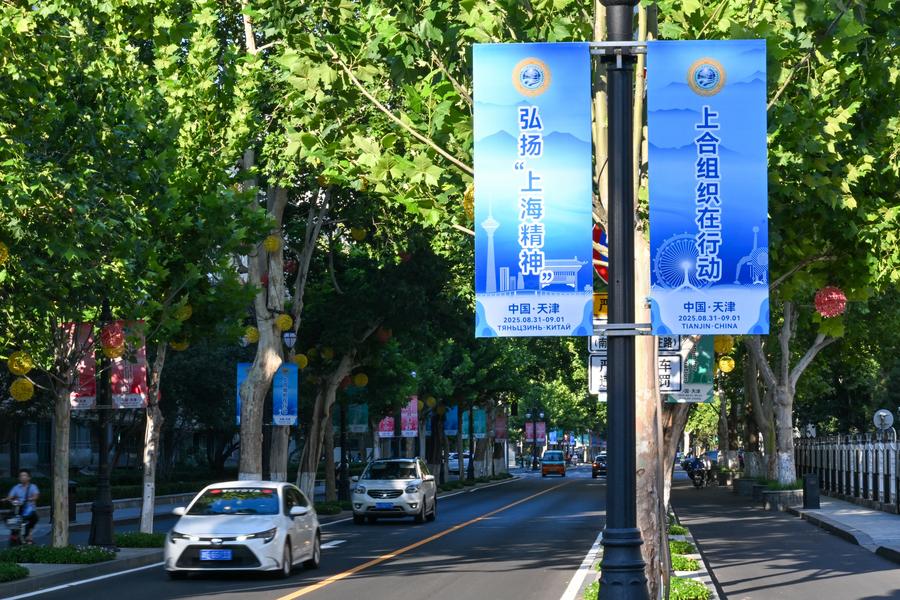
Banners marking the Shanghai Cooperation Organization (SCO) Summit 2025 are pictured on a street in Tianjin, north China, Aug. 25, 2025. (Xinhua/Sun Fanyue)
FOUNDED IN SECURITY, SUSTAINED BY STABILITY
The SCO was founded with security at its core, evolving from the "Shanghai Five," a mechanism formed by China, Russia, Kazakhstan, Kyrgyzstan and Tajikistan in 1996 to manage border security after the end of the Cold War. In June 2001, the SCO was established with Uzbekistan joining as its sixth member.
Since then, the SCO members have forged a constructive partnership based on non-alignment, non-confrontation and a commitment not to target any third party. They have remained dedicated to the Shanghai Spirit, a set of guiding principles that emphasizes mutual trust, mutual benefit, equality, consultation, respect for diversity of civilizations and pursuit of common development.
The practice of this innovative philosophy has transcended "anachronistic ideas such as clash of civilizations, Cold War mentality and zero-sum game," thereby "opening a new chapter in the history of international relations," Xi noted.
When Xi attended his first SCO summit as China's president in September 2013, he outlined his vision for regional security amid a wave of emerging threats, including the spread of terrorism and extremism across Central Asia, and a surge in cross-border crime.
"No country can tackle these challenges alone," Xi said. "We must strengthen cooperation."
At every subsequent SCO summit, Xi has emphasized security cooperation as a cornerstone of the organization's agenda. At the Qingdao Summit in 2018, he introduced China's vision of common, comprehensive, cooperative and sustainable security within the SCO framework.
"Real security is premised on the security of all countries," Xi said at the Astana Summit last year, reflecting his long-standing view on security.
The Chinese president cautioned that a nation cannot ensure its own security by undermining that of others, invoking a Kazakh proverb: "One who tries to blow out another's oil lamp will only set his own beard on fire."
Over the years, SCO members have held joint anti-terror drills and worked together against drug trafficking, cybercrime and cross-border organized crime. Their cooperation now extends to new areas such as data security, biosecurity and outer space security. On regional flashpoints like Afghanistan, the SCO has consistently voiced support for efforts toward peace and development.
The member states have foiled more than 1,400 terrorism- and extremism-related cases so far, helping anchor security across the region.
Ambassador Fan Xianrong, who is responsible for the work of China's SCO national coordinator, said that he expects the organization to accelerate the development of security centers, including a comprehensive hub for emerging threats and a dedicated anti-drug facility.
"These measures will reinforce the SCO's position as a key stabilizing force, fostering peaceful development among its member states," said Marina Dmitrieva, deputy director of the Institute of Asian Studies for Science and Innovation at Russia's Far Eastern Federal University.
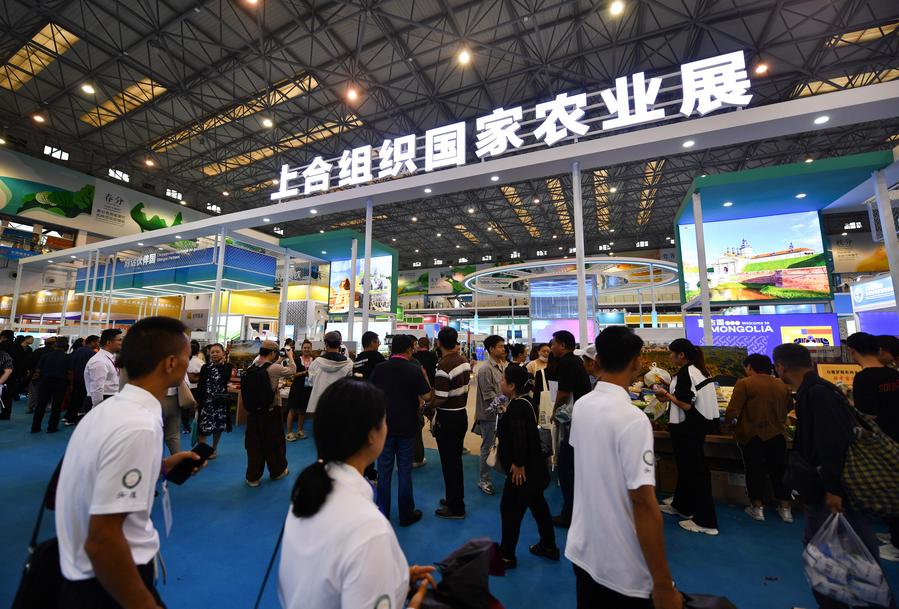
People visit an agriculture exhibition for members of the Shanghai Cooperation Organization (SCO) during the 30th China Yangling Agricultural Hi-tech Fair in Yangling, northwest China's Shaanxi Province, Sept. 19, 2023. (Xinhua/Zhang Bowen)
PURSUING COMMON DEVELOPMENT
Xi believes that development is the ultimate form of security and the master key to tackling regional security challenges.
The China-Kyrgyzstan-Uzbekistan railway, a key regional infrastructure project, gained momentum under Xi's sustained attention. Construction began last December in Jalalabad, Kyrgyzstan, and Xi sent a congratulatory message expressing his hope that the railway will become a new model project under the Belt and Road Initiative (BRI).
The alignment between the SCO and the BRI is natural, as many SCO countries lie along the ancient Silk Road. It was in Kazakhstan that Xi first proposed the Silk Road Economic Belt in 2013, which later evolved into the BRI. Today, the initiative serves as a key platform for SCO practical cooperation.
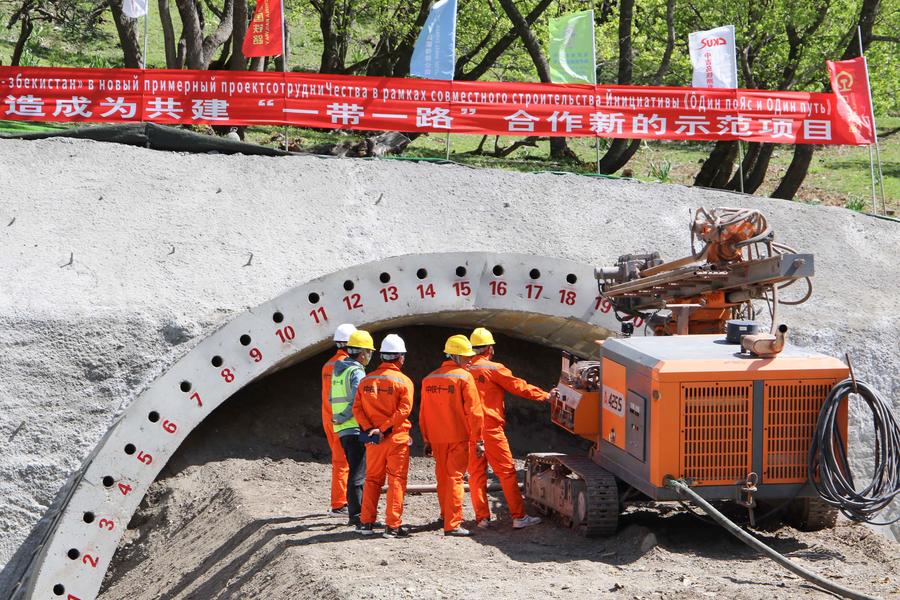
Staff members operate at a construction site of the China-Kyrgyzstan-Uzbekistan railway project, in Jalalabad, Kyrgyzstan, April 29, 2025. (Photo by Roman Gainanov/Xinhua)
Enhanced connectivity has propelled trade to new heights. Last year, China's trade with other SCO countries hit a record 890 billion U.S. dollars, accounting for 14.4 percent of China's total foreign trade.
A range of initiatives proposed by Xi -- from the local economic cooperation zone in Qingdao and the agricultural technology training base in Shaanxi to expanded use of local currency settlement -- have deepened practical collaboration among SCO members, according to Li Yongquan, a senior researcher at China's State Council Development Research Center.
Xi also pushed for closer cooperation in emerging fields such as the digital economy, e-commerce and artificial intelligence (AI), where China's industrial edges offer opportunities for other SCO members.
A recent poll among SCO countries found that nearly 70 percent of respondents credit the organization with advancing their nations' sustainable development and modernization.
Since assuming the SCO rotating presidency last July, China has facilitated the implementation of over 100 events under the "Year of Sustainable Development" theme, including ministerial meetings covering broad domains.
Fan Xianrong said he believes China will work with all parties to strengthen regional industrial and supply chains and foster new growth drivers -- from clean energy to AI applications -- to offset turbulence in the global trade system.
"The SCO's experience demonstrates that countries with different social systems and varying levels of development can achieve coordinated progress, mutual benefit and win-win outcome," Chinese Foreign Minister Wang Yi wrote in a signed article published on Saturday.
EMBRACING EQUALITY AND INCLUSIVENESS
During a visit to Uzbekistan in 2022, Xi presented a distinctive gift to Uzbek President Shavkat Mirziyoyev: a miniature model of the historical city of Khiva, whose cultural monuments had been restored through a bilateral preservation project.
Known as "the pearl of the ancient Silk Road," Khiva, in south-central Uzbekistan, is home to Islamic architectural treasures, including majestic mosques and soaring minarets which date from the 17th century.
The conservation project was launched during Xi's first visit to Uzbekistan as the Chinese president in 2013. Three years later, on another visit, he checked the restoration work and urged Chinese experts to collaborate with their Uzbek partners to better protect the cultural relics.
Khiva represents China's first endeavor in helping preserve cultural heritage in Central Asia. In recent years, Chinese teams have worked alongside experts across the region to protect more historical sites, from the Rahat ruins in Kazakhstan to ancient Buddhist temple remains in Kyrgyzstan.
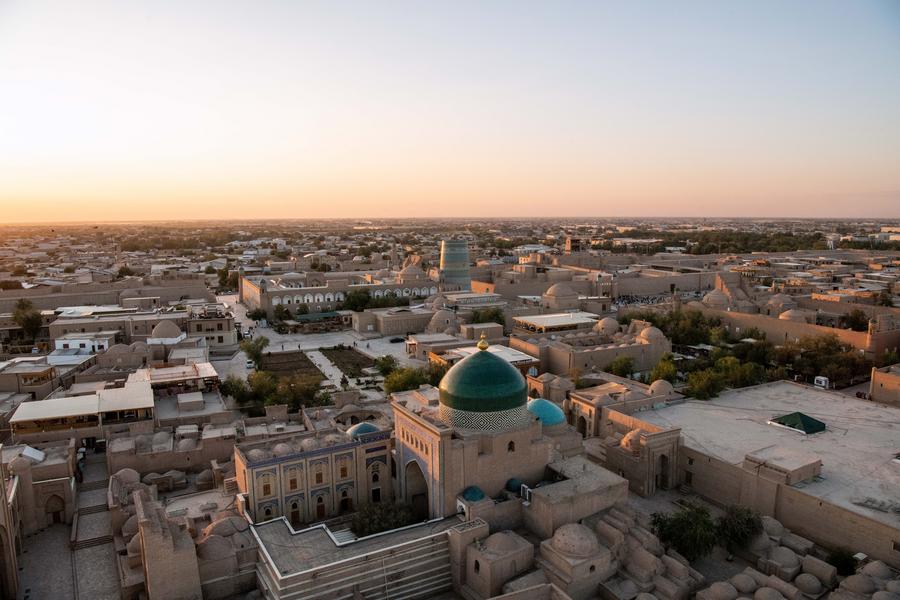
This file photo taken on Sept. 21, 2023 shows a view of the historical city of Khiva, Uzbekistan. (Xinhua/Wu Huiwo)
Copyright 2021 Foreign Affairs Office of Hainan Province. All rights reserved.
Copyright 2021 Foreign Affairs Office of Hainan Province.
All rights reserved.